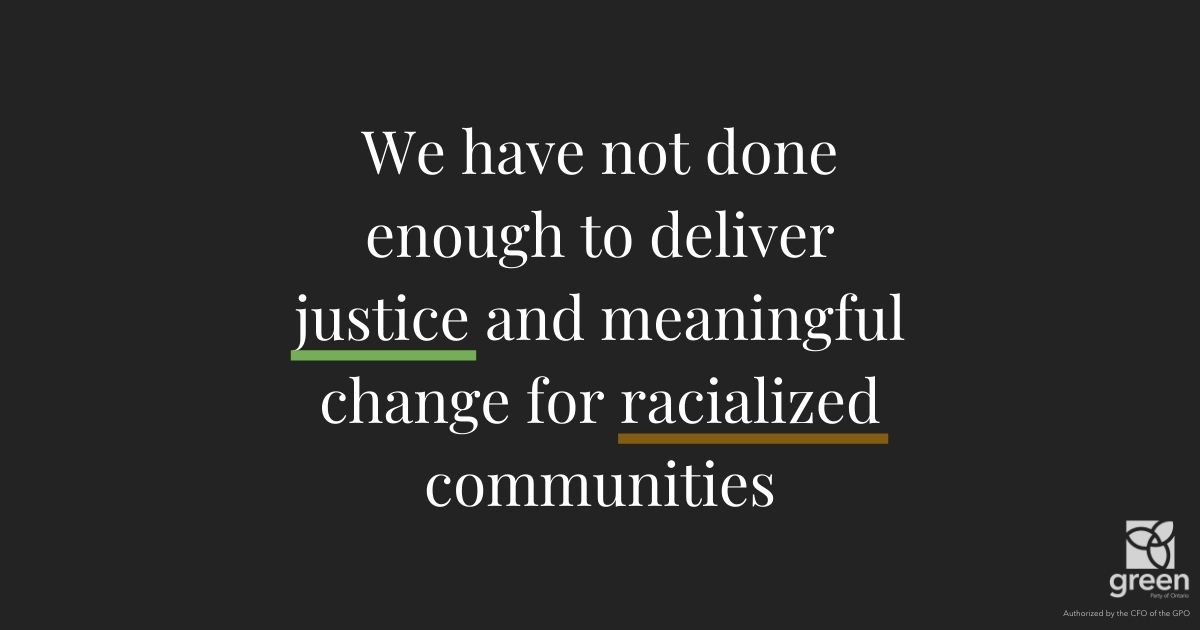We must be open to meaningful reforms to defend Black lives
News
July 24, 2020
Change must come at every level - from checking our own personal actions and biases to rebuilding institutions that are failing to keep racialized communities safe. Continue reading
Share
Share on socials

By Mike Schreiner
The death of George Floyd in the United States has sparked a global movement to end police brutality against racialized communities. The deaths of D’Andre Campbell, Regis Korchinski-Paquet, Chantel Moore, Ejaz Choudry and others during encounters with the police tell us that this conversation is urgent in Canada as well.
The roots of colonization and oppression run deep in our country and cannot be denied. Some of our institutions were founded on racist ideas – built to serve white settler communities, while dominating Indigenous people. For years, racialized communities have demanded an end to the systemic racism that continues to harm them, from aggressive acts of violence to structural barriers and subtle forms of discrimination.
We have not done enough to deliver justice and meaningful change.
As a white person of privilege, I cannot know the pain being felt by Black, Indigenous and People of Colour as they continue to endure systemic racism. But as an elected representative, I can listen, learn, and work on urgent change to seek justice and defend the lives of Black, Indigenous and People of Colour.
Change must come at every level – from checking our own personal actions and biases to rebuilding institutions that are failing to keep racialized communities safe. While changes are not limited to police and law enforcement alone, this is where the conversation must urgently begin.
I am actively speaking with racialized individuals, advocacy groups and organizations to understand the changes they want to see, and how I can support the systemic change they seek. For instance, we need to question whether someone in clear distress caused by a mental illness is best helped by an armed officer coming to their door, instead of a mental health professional.
According to a CBC survey, 70% of those who died in police confrontations between 2000 and 2017 in Canada were struggling with mental health or addiction issues. The report commissioned after Sammy Yatim’s death found that “Toronto Police Service alone cannot provide a complete answer to lethal outcomes involving people in crisis.”
The intersection between race and mental health far too often leads to tragic outcomes when armed police officers are the first responders.
The Centre for Mental Health and Addictions has called for a new direction in crisis care in which people are first met by trained mental health responders, not the police.
The province must invest in better mental health services so fewer people find themselves in a crisis to begin with.
It’s not just mental health.
Many fatal encounters start with a crime of poverty that is driven by a lack of access to housing, employment, education, or other social determinants of health. A report earlier this year found that poverty costs Ontario up to $33 billion per year, including $1 billion to our justice system.
I have always believed that society must focus more on the root causes of problems.
There are countless studies that show if we adopted more ‘upstream’ thinking about keeping people safe and healthy in the first place, then we would need to spend less on interventions like police and justice or emergency health care to deal with a crisis.
- Policing is the biggest line item in Toronto’s city budget at over $1 billion, or 23% of the average person’s property taxes going to the police. On the flip side, just 5% goes towards shelters and housing.
- The Waterloo Region Police budget rose 6% this year from $189 million to $200 million, representing one-third of the regional property tax bill.
- In Barrie, the $56 million police budget is 4.5 times larger than the money spent on children and community services, Ontario Works and social housing combined.
These statistics show that the provincial government, as the level of government responsible for funding most social and health programs, is not investing enough in the social support that people need to prevent being in crisis.
Investments in social programs, affordable housing, mental health support, and education initiatives are part of our responsibility to tackle system racism.
We need community programs to help people overcome systemic racism rather than leaving them vulnerable to hostile encounters where they are once again the victims of systemic racism. We should prevent poverty as a first course of action before resorting to policing it.
I understand the feeling of discomfort that some people have with redirecting or reimagining police budgets. But I’ve spoken with police officers who are challenging these feelings and asking themselves tough questions. Guelph’s former Chief of Police has stated that we cannot arrest our way out of the mental health and addictions crisis in our community.
The biggest mistake we can make right now is to close ourselves off to meaningful conversations about how to defend Black and Indigenous lives. Every option should be on the table if it will better ensure community safety:
- We must promise full transparency and justice for racialized individuals who have died or been victims of violence and discrimination at the hands of police.
- We must direct resources towards poverty reduction, affordable housing, mental health supports, education and other social programs that will reduce encounters with police.
- We must listen to the growing chorus of racialized communities and mental health experts calling for a mental health response rather than an armed police response to someone in distress.
- We must invest in true anti-racism strategies and initiatives across every level of society to reverse the damage of past and present injustices and inequalities.
I know that this is only the beginning of the conversation, but this is where I believe change must start.